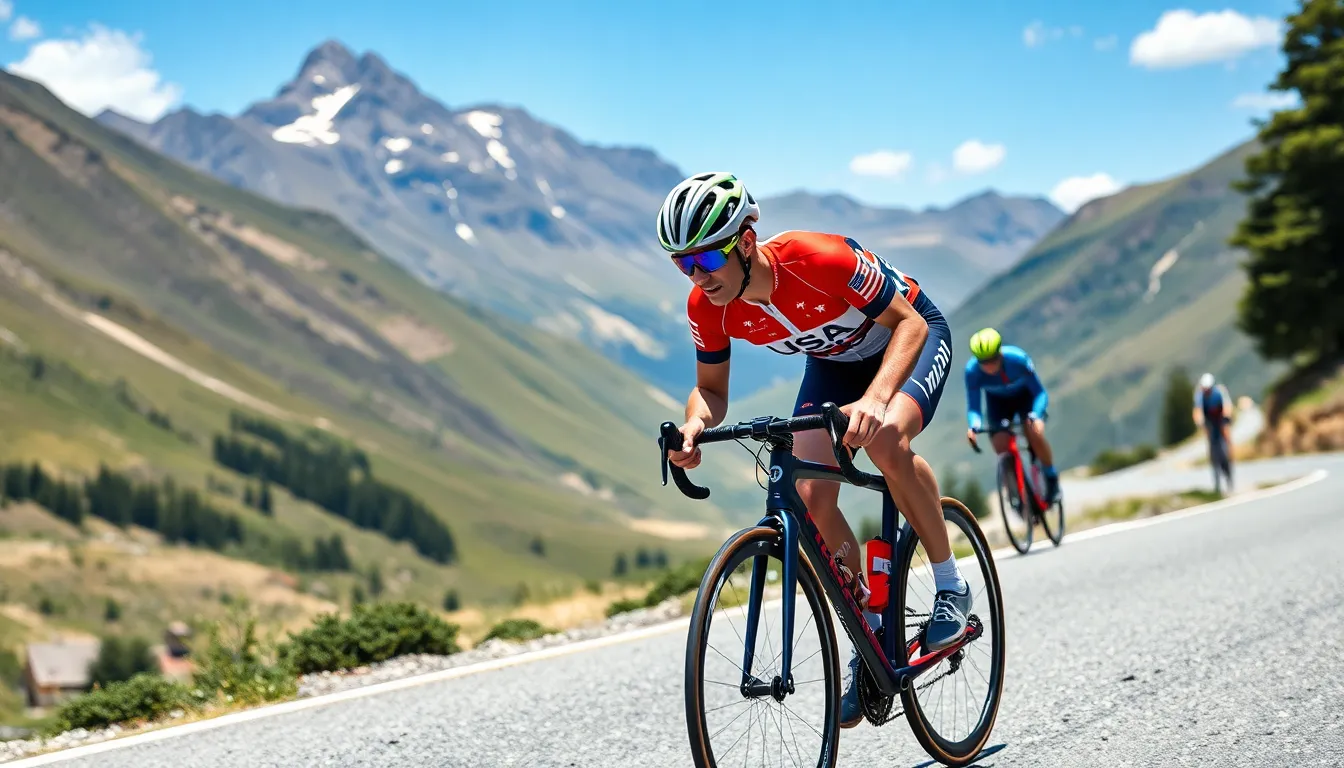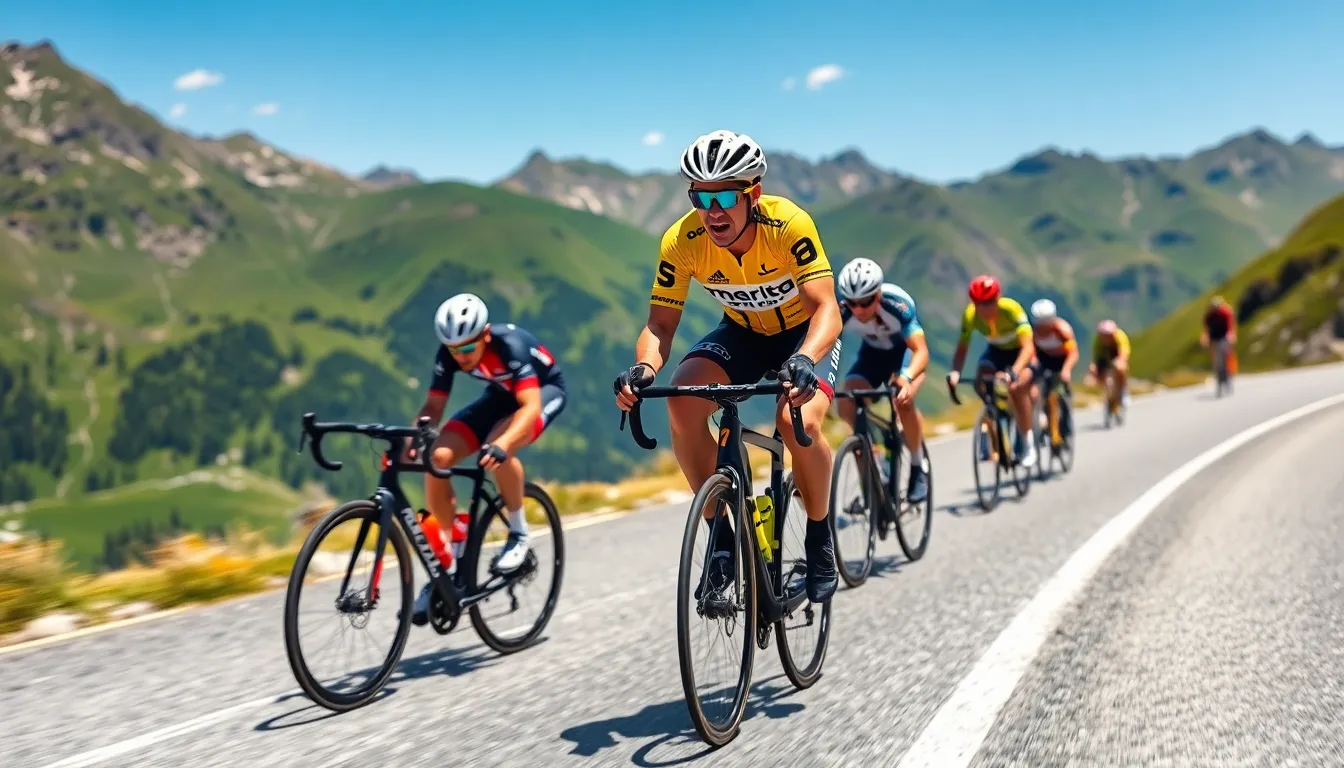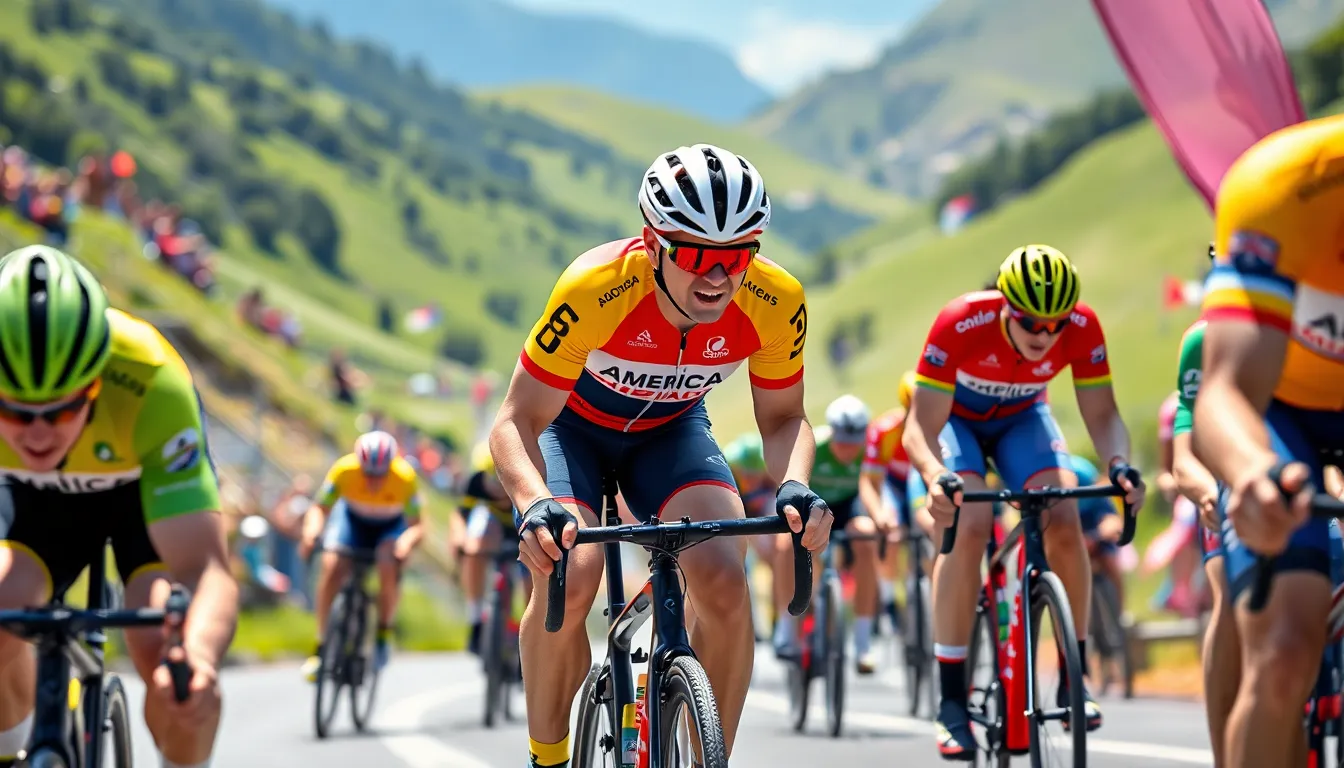As the excitement builds for the 2024 Tour de France, cycling enthusiasts eagerly anticipate the fierce competition and breathtaking landscapes that define this iconic race. From the cobblestone streets of Paris to the challenging mountain passes, every stage offers a chance for riders to showcase their endurance and strategy. With teams gearing up and athletes fine-tuning their skills, the standings will soon reflect the hard work and determination put forth by each competitor.
Fans can expect thrilling battles for the yellow jersey as seasoned veterans and rising stars alike push their limits. The 2024 edition promises to be one of the most competitive yet, with every second counting in the race for glory. Keeping an eye on the standings will be essential for anyone wanting to stay connected with the action and drama that unfolds over three grueling weeks.
Table of Contents
ToggleOverview of Tour De France 2024
The 2024 Tour de France features a lineup of elite teams and athletes from around the globe. Riders traverse challenging terrains across France, facing steep climbs and rapid descents. Each stage tests their endurance and strategy, contributing to the overall standings.
The race consists of 21 stages over 23 days, beginning on July 1 and concluding on July 23. Key stages include the high mountain passes of the Alps and Pyrenees, crucial for gaining time in the general classification. Riders target the iconic yellow jersey, awarded to the overall leader.
As of now, several contenders emerge, including seasoned champions and rising stars. Cyclists compete not just for personal glory but also for team success. Every point matters in this prestigious event, making each stage critical for standings.
Anticipation builds as fans watch for thrilling sprints, breakaways, and strategic alliances. Key rivalries develop, adding excitement to the unfolding drama. Enthusiasts follow the live updates to track their favorite riders’ performance and position throughout this historic race.
Fans eagerly await the developments, knowing that every pedal stroke influences the final outcome.
General Standings



The 2024 Tour de France general standings reflect the performance of riders across various stages, highlighting the intense competition for the prestigious yellow jersey. Each stage plays a critical role in determining the outcomes, and standings update frequently throughout the event.
Yellow Jersey Competition
The yellow jersey signifies the overall leader in the general classification. Riders accumulate time based on their performance across each stage. Key contenders for the yellow jersey include established champions and ambitious newcomers, all pursuing time gains during crucial segments like mountain stages in the Alps and Pyrenees. The excitement builds as fans follow fierce battles and strategic efforts to secure the leading position.
Points Classification
The points classification rewards riders for speed and consistency beyond the general classification. Riders earn points for stage finishes, with more points awarded for high placements in flat and sprint stages. Daily efforts contribute to the standings, allowing sprinters to excel. This competition adds another layer of intrigue, highlighting dynamics among teams as they vie for both individual glory and collective success.
Team Standings
The 2024 Tour de France showcases dynamic competition among teams as they strive for top rankings. Performance impacts not only individual riders but also overall team standings throughout the race.
Top Performing Teams
| Rank | Team | Points | Time |
|---|---|---|---|
| 1 | Jumbo-Visma | 500 | 72h 14m |
| 2 | UAE Team Emirates | 480 | 72h 25m |
| 3 | Ineos Grenadiers | 450 | 72h 30m |
| 4 | Bora-Hansgrohe | 400 | 72h 40m |
| 5 | Quick-Step Alpha Vinyl | 370 | 72h 55m |
Top performing teams exhibit strong teamwork and strategy. Jumbo-Visma leads the standings through consistent finishes and robust team support. UAE Team Emirates follows closely, showcasing elite riders equipped for both sprint and climbing stages. Ineos Grenadiers maintains competitive times during mountain stages, while Bora-Hansgrohe leverages sprint finishes. Quick-Step Alpha Vinyl rounds out the top five, securing vital points through strategic placement in flat stages.
Notable Team Strategies
- Collaborative Efforts: Teams employ coordinated tactics, optimizing rider strengths in specific terrains.
- Lead Out Trains: Some teams focus on forming lead-out trains during sprint stages to maximize speed and enhance finishing positions.
- Climbing Specialists: Teams designate key riders for mountain stages, prioritizing their energy conservation for steep climbs.
- Tactical Breakaways: Strategic breakaways from the peloton allow teams to gain valuable time, affecting overall standings.
- Adaptability: Teams maintain flexibility, adjusting strategies based on stage profiles and competitor strengths.
Notable strategies directly influence team performance and standings. Collaboration among team members often leads to better overall results, as tactical decisions adapt to the unfolding dynamics of each stage.
Rider Performances
Rider performances at the 2024 Tour de France significantly impact standings and the overall excitement of the race. The competition among elite athletes continues to define each stage, showcasing remarkable endurance, strategy, and skill.
Key Riders to Watch
Key riders emerge as favorites, each bringing unique strengths to the race.
- Tadej Pogačar: Defending champion, known for his climbing abilities and tactical acumen.
- Jonas Vingegaard: Climbing specialist, excelling in mountain stages and strong against the clock.
- Wout van Aert: Versatile sprinter and time-trialist, crucial for team dynamics in various stages.
- Jai Hindley: Rising climber, aiming for breakthrough performances in the high mountain stages.
- Ethan Hayter: Young sprinter, demonstrating impressive speed that could earn him podium finishes.
These riders are pivotal in the race for the yellow jersey, consistently vying for lead spots in both general and points classifications.
Breakout Performances
Breakout performances in the race highlight emerging talent and unexpected achievements.
- Thomas Pidcock: Notable for aggressive riding style and adaptability across terrains.
- Juan Ayuso: Young rider showcasing exceptional climbing skills, positioned to challenge seasoned veterans.
- Vincenzo Nibali: Veteran presence, making a significant impact with strategic stage wins and experience.
- Stefan Küng: Strong time trialist, improving his overall standings with consistent efforts in flat stages.
- Magnus Cort: Breakout sprinter, capturing attention with his speed in sprint finishes and intermediate stages.
Such performances not only elevate individual standings but also enhance overall team efforts, contributing to compelling narratives throughout the race.
Impact on Future Races
The standings from the 2024 Tour de France significantly influence future races in professional cycling. Each rider’s performance shapes expectations for subsequent events, contributing to their reputation and legacy. For instance, strong finishes inspire confidence, attracting potential sponsors and increasing media attention.
Top-performing teams, like Jumbo-Visma and UAE Team Emirates, set benchmarks for strategy and teamwork. Their tactics become case studies for other teams aiming to enhance performance. Success in this prestigious race often leads to increased support in future competitions, encouraging them to refine their approaches.
Emerging talents’ results impact their trajectory, shifting dynamics within teams and the sport. Riders like Jai Hindley and Ethan Hayter, demonstrating exceptional skills, could lead to opportunities in elite competitions. Conversely, veteran riders may reassess their strategies based on younger competitors’ performances, fostering evolution within the sport.
The excitement surrounding victories and records motivates teams and athletes to elevate their performance levels. The implications of the 2024 standings contribute to shaping race strategies, recruitment, and training methods as stakeholders analyze outcomes to gain competitive advantages in future events.
Overall, the Tour de France not only highlights individual and team prowess but also affects future race preparations and strategies throughout professional cycling, ensuring the cycle of competition remains dynamic and engaging.


